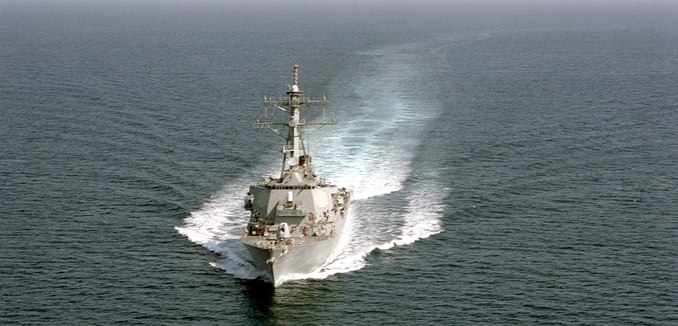Iran has captured ten U.S. Navy sailors aboard two American naval vessels in the Persian Gulf, the Pentagon announced Tuesday.
The ships were moving between Kuwait and Bahrain when the Navy lost contact with them, the Associate Press reported. “We have been in contact with Iran and have received assurances that the crew and the vessels will be returned promptly,” Pentagon Spokesman Peter Cook told the AP. Bahrain and Kuwait are located on the western end of the Persian Gulf, across the waters from Iran.
Iran’s semi-official Fars news agency reportedly announced on the messaging app Telegram that the Islamic Revolutionary Guard Corps (IRGC), Iran’s elite extraterritorial militia, had arrested 10 Americans for illegally entering Iranian waters, before later deleting it from its website.
An Iranian ship fired rockets near the American aircraft carrier Harry S Truman in December, an act that U.S. Central Command spokesman Cmdr. Kyle Raines called “highly provocative.” The Pentagon released footage of the incident last week after a Freedom of Information Act request.
The incident occurred shortly after the Truman returned to the Gulf, ending a two-month absence of American aircraft carriers in the tension-filled waters.
The Wall Street Journal reported last week that the White House rebuffed leaders of Iran’s 2009 pro-democracy Green Movement when they turned to the U.S. government for support. According to current and former U.S. officials, the decision was influenced by President Barack Obama’s reluctance to jeopardize future nuclear talks with the Iranian regime.
The Journal also reported that hardliners backed by Supreme Leader Ayatollah Ali Khamenei have become stronger since Tehran reached a nuclear deal with world powers in July, while the power of Iranian reformists has diminished.
Experts have long worried that the nuclear deal would embolden Iranian hardliners and further entrench the administration’s reluctance to challenge Iran, as Tehran would be able to use any American pushback as a pretext from walking away from the deal.
Vice Admiral Kevin Donegan, the commander of the U.S. Navy’s Fifth Fleet, said in November that signing the deal had not changed Iran’s “malign behavior” at sea.
American naval vessels have frequently been the target of Iranian provocations. In 2014, Iran broadcast a simulation of its forces bombing the American aircraft carrier USS Abraham Lincoln on state television. In February, the IRGC’s naval military training exercises including the sinking of a mock U.S. aircraft carrier. The exercises were also broadcast on state television, accompanied by banner text of a quote by Ayatollah Ruhollah Khomeini, the first Supreme Leader of the Islamic Republic: “If the Americans are ready to be buried at the bottom of the waters of the Persian Gulf – so be it.” And in March, an Iranian surveillance aircraft came unusually close to a Navy helicopter from the USS Carl Vinson.
Iran has also frequently challenged America’s commitment to protecting global shipping in the Persian Gulf. In April, Iran seized the Marshall Islands-flagged ship Maersk Tigris, holding it for ten days in violation of international law. In May, an Iranian ship fired on a Singapore-flagged ship.




